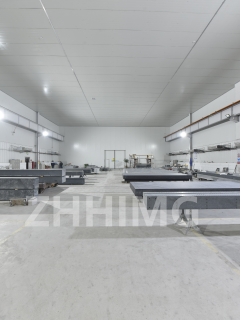Precision black granite parts have gained widespread popularity in the manufacturing industry due to their unique properties and characteristics. Black granite is a type of igneous rock that is dense, hard, and durable, making it ideal for high-precision applications. However, as with any material, there are advantages and disadvantages of using precision black granite parts. In this article, we will explore both the advantages and disadvantages of using these parts.
Advantages of Precision Black Granite Parts
1. High Precision: Precision black granite parts provide high precision and accuracy in measurements and operations. The dense and hard nature of black granite makes it resistant to wear and tear and ensures that the parts retain their precision and accuracy over time.
2. Dimensional Stability: Precision black granite parts have excellent dimensional stability, which means that they do not deform or distort under varying temperature and pressure conditions. This leads to more consistent performance and reliable results across different environments.
3. Vibration Damping: Black granite is known for its ability to dampen vibrations. This characteristic makes it ideal for use in equipment and machinery that requires high vibration resistance.
4. Corrosion Resistance: Precision black granite parts are resistant to corrosion, which means they can withstand harsh industrial environments and chemical exposure. This makes them a reliable choice for long-term use in manufacturing facilities.
5. Aesthetic Appeal: Black granite has a sleek and polished appearance, which adds an aesthetic appeal to precision parts made of this material. This makes them an ideal choice for industries that prioritize both form and function.
Disadvantages of Precision Black Granite Parts
1. Weight: Black granite is a heavy material, which means that precision parts made of this material can be heavier than those made of other materials. This can limit their use in applications where weight is a critical factor.
2. Fragility: Despite being a durable material, black granite is still susceptible to cracks and fractures under impact. This can limit the applications of precision black granite parts in industries where there is a likelihood of impact or rough handling.
3. Cost: Precision black granite parts can be more expensive than parts made of other materials. This is because black granite is a premium material that requires specialized manufacturing processes and equipment.
4. Limited Availability: High-quality black granite is not readily available everywhere, which can limit the availability of precision black granite parts. This can also lead to longer lead times and higher costs due to the additional time required to source the desired material.
Conclusion
In conclusion, there are both advantages and disadvantages to using precision black granite parts. Its high precision, dimensional stability, vibration damping, corrosion resistance, and aesthetic appeal are significant advantages, while its weight, fragility, cost, and limited availability present some disadvantages. Despite these limitations, precision black granite parts remain an excellent choice for industries that require high accuracy and precise measurements. As long as the applications of these parts fall within their potential use cases, they can provide a reliable and long-lasting solution.
Post time: Jan-25-2024

